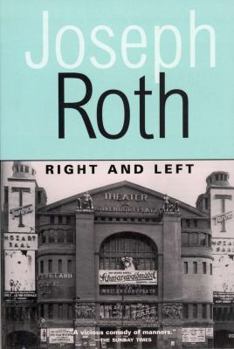Right and Left
Select Format
Select Condition 
Book Overview
Bei Ausbruch des Krieges bricht Paul Bernheim seine Studien in Oxford ab. Er darf bei den Dragonern reiten, wird aber als Verpflegungsoffizier hinter die Front kommandiert. Tief entt uscht wandelt er... This description may be from another edition of this product.
Format:Paperback
Language:English
ISBN:1585674923
ISBN13:9781585674923
Release Date:January 2004
Publisher:Harry N. Abrams
Length:235 Pages
Weight:0.68 lbs.
Dimensions:0.7" x 5.4" x 8.0"
Customer Reviews
2 ratings
Choose the Other Edition ...
Published by Thriftbooks.com User , 14 years ago
... the same translation by Michael Hofmann, but combined with Roth's last masterpiece, "The Legend of the Holy Drinker". Here's the review I wrote of "Right and Left" in that other edition: ""The English title - Right and Left - of Joseph Roth's 1929 novel 'Rechts und Links' almost automatically suggests a clash between furious Fascism and surly Bolshevism, but such is not the case in this oddly-inconclusive narrative. Roth's subject is the precarious middle -- the haplessly middling Middle Class of Middle Europe amid the false peace between the two World Wars. The three principal characters are also stuck in the middle between Jewish and 'German' identities, being of 'mixed' blood. Two brothers, Paul and Theodore Bernheim, with a German father and a guardedly Jewish mother, are the anti-protagonists of the novel. Dashing Paul is full of arrogant mediocrity, with a middling measure of charm and the luck of a bottle thrown in the sea with a note in it; it WILL wash ashore somewhere, but the message turns out to be blank. Snarly Theodore is full of mediocre arrogance compounded with raging sibling-envy and self-hatred; half Jewish, he first clings to Brown Shirt anti-semitic nationalism for an identity fix, then finds himself suborned as a journalist-provocateur for a 'liberal' newspaper. The closeted owner of the newspaper is Nikolai Brandeis, a stateless immigrant who has by his own account already lived the lives of three different people. Brandeis is not so much unscrupulous as aloof from scruples; for such a man, getting rich is simply a choice. He is also, metaphorically, the stroller on the beach who snatches Bottle Paul from the waves and reads the blank page. Brandeis arrives on the scene at the end of Part One of this three-part book, and his appearance rescues both the brothers and the reader from drift. Brandeis is a fascinating character, and interesting characters make interesting reading. It's a literary weakness of this novel that it starts so slowly, that it spends more time than necessary establishing the mediocrity of the brothers. Yes, of course, middling characters must be given middling flaws and suffer middling crises, but for the first time in my experience of reading Joseph Roth I found that I doubted whether he knew where his novel was going next. I'd almost admitted boredom when Brandeis materialized. Brandeis is effectively The Wandering Jew of European imagination, an 'immortal' outsider who re-invents himself at will. All three chief characters are immensely convincing, by the way, and that in itself is enough to rescue 'Right and Left' from novelistic mediocrity. Don't expect to empathize with anyone in this book -- or if you do, take a quick look in the mirror and despair for your life! Roth's treatment of the milieu is bitterly satirical, not unlike that of Sinclair Lewis writing about Main Street America in the same decade. It may be another weakness of the novel that Roth so obviously despises his creatures
Excellent Portrayal of Weimar Germany
Published by Thriftbooks.com User , 17 years ago
"Right and Left" chronicles the temporarily intertwined lives of two characters whose circumstances and personalities reflect the uncertainties of German society in the post-World War I era. Paul Bernheim is the weak and vacillating, though well-intentioned scion of a wealthy family whose fortunes have collapsed amidst the inflation and chaos of the 1920s. On the other hand is Brandeis, the enigmatic and unscrupulous Russian emigre who thrives in the disordered atmosphere of the times. Their paths cross amidst the glamorous nightclubs, gambling dens and upscale restaurants of Weimar Berlin. Published in 1929, the book presciently foreshadows the disaster looming on Europe's horizon, perhaps most clearly in Roth's depiction of Theodor Bernheim, Paul's younger brother, an enthusiastic member of a right-wing, anti-semitic paramilitary group. Though "Right and Left" may lack the dramatic impact of "The Radetzky March," it does effectively portray the malaise at the heart of German society in the 1920s, if not as artfully as "Flight Without End." Nonetheless, the book is well worth reading for its depiction of its time, its excellent prose and the clever insights that are Roth's stock in trade.





